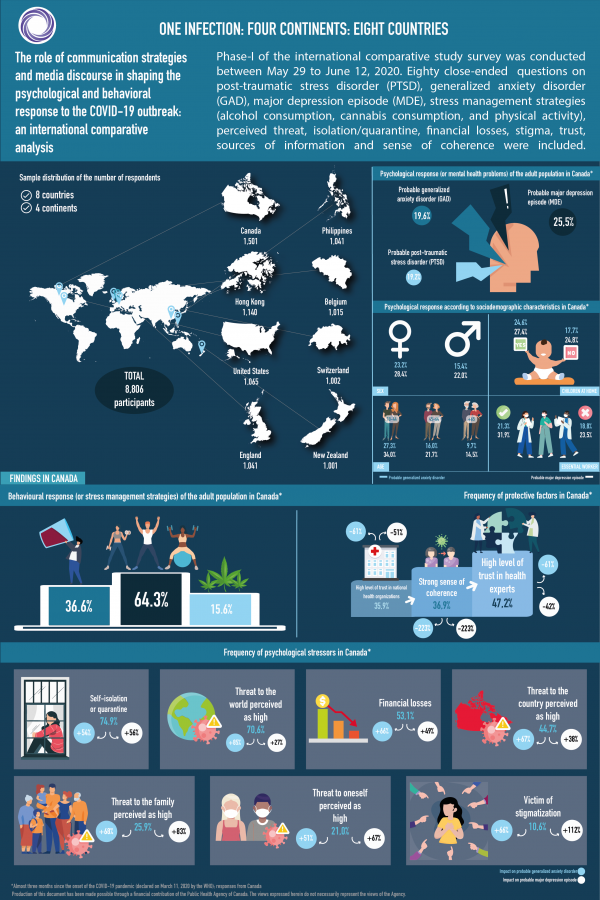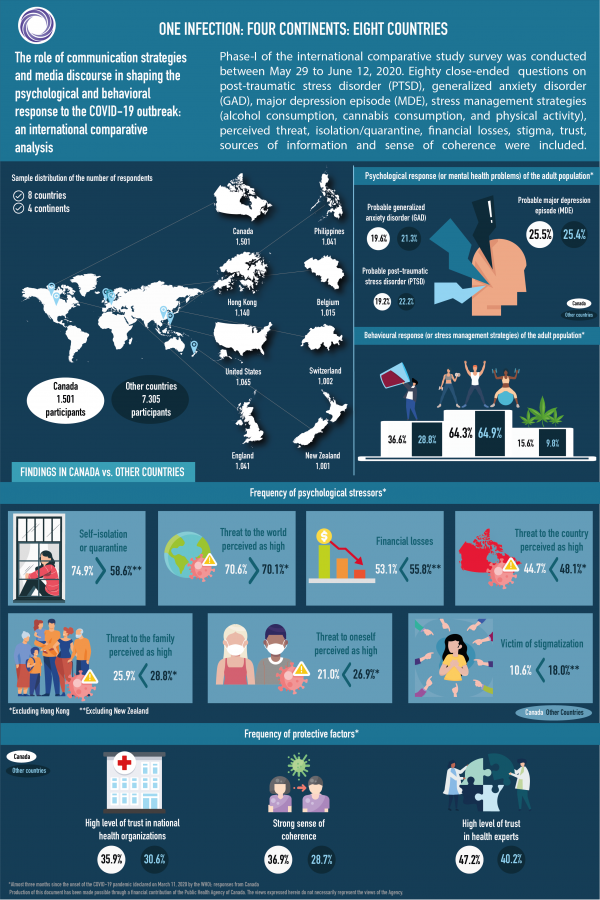“The role of communication strategies and media discourse in shaping the psychological and behavioural response to the COVID-19 outbreak: an international comparative analysis”
During the current COVID-19 pandemic, NCCID has been nimble and responsive, initiating and partnering on numerous COVID-19 related knowledge translation activities. Among them, NCCID is a partner with a team of Canadian and international researchers to develop knowledge exchange and translation strategies on the burning issue of psychosocial health to inform public health decision-makers at all levels and the scientific community.
A mixed-method approach has been adopted to study these complex issues. First, a population-based survey will be conducted in all participating countries that will examine various psychosocial issues (perceptions, understandings, psychological consequences, behaviours adopted), according to the different social groups including the high-risk ones. Then, a discourse analysis of the authorities, media, and socio-digital content will be performed. Finally, a network analysis (e.g. information disseminated by WHO, distribution lists, reception, and use of information, type of actors reached) will allow assessing how official information flows and circulates across levels of governance.
Psychosocial Impacts of the COVID-19 Pandemic
Results of a Broad Investigation in Québec
International Journal of Environmental Research and Public Health Article
Additional Resources
Project description
The Role of Communication Strategies and Media Discourse in Shaping the Psychological and Behavioral Response to the COVID-19 Outbreak: An International Comparative Analysis, is a research grant funded by the Canadian Institutes of Health Research (CIHR) initiated by a multidisciplinary team from the Université de Sherbrooke under Principal Investigator, Dr. Mélissa Généreux. Partners and collaborators are from Canada, the USA, Philippines, Hong Kong, Brazil, England, New Zealand, Switzerland, and Belgium. The aim of the grant is to investigate psychological and behavioural responses to the pandemic and the influence of communication strategies, news from traditional (mainstream media) and social media sources, and other stressors and protective factors in eight countries.
Phase-I Outcomes
Phase-I of the international comparative study survey was issued and operated by Leger and its international collaborators from May 29 to June 12, 2020. The questionnaire contained just over 80 close-ended questions with an allotted completion time of 18 minutes. These questionnaires examined factors such as post-traumatic stress disorder (PTSD), generalized anxiety disorder (GAD), major depression episode (MDE), stress management strategies (alcohol consumption, cannabis consumption, and physical activity), perceived threat, isolation/quarantine, financial losses, stigma, trust, sources of information and sense of coherence. A representative sample of 8,806 individuals participated in the survey: 1,501 adults from Canada and 7,305 from seven other countries (Table 1).
Table 1. Sample distribution of the number of respondents
| Canada | 1,501 |
| United States | 1,065 |
| England | 1,041 |
| Belgium | 1,015 |
| Switzerland | 1,002 |
| Hong Kong | 1,140 |
| Philippines | 1,041 |
| New Zealand | 1,001 |
| Total | 8,806 |
Findings
Tables 2 to 6 present preliminary results from the survey. A comparative analysis of the participants’ responses from Canada with participants from other countries.
Table 2. Psychological response (or mental health problems) of the adult population, almost three months since the onset of the COVID-19 pandemic (declared March 11, 2020, by the WHO); responses from Canada and all other countries
| Mental health problems | Total (n=8,806) | Canada (n=1,501) | Other countries or regions (n=7,305) |
|---|---|---|---|
| Probable post-traumatic stress disorder, or PTSD (PC-PTSD-5 ≥3)1 | 21.6% | 19.2% | 22.2% |
| Probable generalized anxiety disorder, or GAD (GAD-7 ≥10)2 | 21.0% | 19.6% | 21.3% |
| Probable major depression episode, or MDE (PHQ-9 ≥10)3 | 25.5% | 25.5% | 25.4% |
2 The GAD-7 (7 items) is based on the diagnostic criteria for GAD described in DSM-IV. A composite score ranging between 0 and 21 is possible. A score of 10 or greater indicates a probable GAD that needs to be further evaluated by a clinician.
3 PHQ-9 (9 items) is based on the diagnostic criteria for MDE described in DSM-IV. A composite score ranging between 0 and 27 is possible. A score of 10 or greater indicates a probable MDE that needs to be further evaluated by a clinician.
Table 3. Behavioural response (or stress management strategies) of the adult population, almost three months after the onset of the COVID-19 pandemic (declared March 11, 2020 by the WHO); responses from Canada and all other countries
| Stress management strategies* | Total excluding Hong Kong (n=7,666) | Canada (n=1,501) | Other countries or regions (n=6,165) |
|---|---|---|---|
| Alcohol consumption | 30.3% | 36.6% | 28.8% |
| Cannabis consumption | 10.9% | 15.6% | 9.8% |
| Physical activity | 66.8% | 64.3% | 64.9% |
Table 4. Psychological response according to sociodemographic characteristics, Canada (n=1,501)
| Sociodemographic characteristics | Probable generalized anxiety disorder (%) | Probable major depression episode (%) |
|---|---|---|
| Sex | ||
| Women | 23.2% | 28,4% |
| Men | 15.4% | 22,0% |
| Age | ||
| 18-44 years | 27.3% | 34.0% |
| 45-64 years | 16.0% | 21.7% |
| 65 years and over | 9.7% | 14.5% |
| Children at home | ||
| Yes | 24.6% | 27.4% |
| No | 17.7% | 24.8% |
| Essential worker | ||
| Yes | 21.3% | 31.9% |
| No | 18.8% | 23.5% |
Table 5. Frequency of psychological stressors, Canada in comparison to other participating countries
| Stressors | Total (n=8,806) | Canada (n=1,501) | Other countries or regions (n=7,305) | Impact on GAD (Canada) | Impact on MDE (Canada) |
|---|---|---|---|---|---|
| Threat to oneself perceived as high | 25.7%1 | 21.0% | 26.9%1 | +51% | +67% |
| Threat to the family perceived as high | 28.2%1 | 25.9% | 28.8%1 | +68% | +83% |
| Threat to the country perceived as high | 47.4%1 | 44.7% | 48.1%1 | +67% | +38% |
| Threat to the world perceived as high | 70.2%1 | 70.6% | 70.1%1 | +85% | +27% |
| Self-isolation or quarantine | 61.9%2 | 74.9% | 58.6%2 | +54% | +56% |
| Financial losses | 55.3%2 | 53.1% | 55.8%2 | +66% | +49% |
| Victim of stigmatization | 16.6%2 | 10.6% | 18.0%2 | +66% | +112% |
2Excluding New Zealand
Table 6. Frequency of protective factors, Canada in comparison to other participating countries
| Protective factors | Total (n=8,806) | Canada (n=1,501) | Other countries or regions (n=7,305) | Impact on GAD (Canada) | Impact on MDE (Canada) |
|---|---|---|---|---|---|
| Strong sense of coherence (SOC-3 ≥4) | 30.1% | 36.9% | 28.7% | -223% | -223% |
| High level of trust in national health organizations (9 or 10/10) | 31.5% | 35.9% | 30.6% | -61% | -51% |
| High level of trust in health experts (9 or 10/10) | 41.4% | 47.2% | 40.2% | -61% | -42% |
Interpretation: A sense of coherence (SOC) is the ability of people to understand, manage, and make sense of an event. The stronger our sense of coherence, the more our ability to cope with adversity is. This study found that overall (i.e. among the eight countries), people with a strong sense of coherence are three times less likely (or about -200%) to have a probable GAD or MDE than those who have a weaker sense of coherence. Of all the factors examined in this study (perceived threat, isolation/quarantine, financial losses, stigma, trust), this is by far the factor that most strongly influences psychological health in times of pandemic.
- Probable GAD: 8.1% among people with a strong SOC vs 26.2% among those with a weak SOC (Canada; n=1,501)
- Probable MDE: 10.6% among people with a strong SOC vs 34.2% among those with a weak SOC (Canada; n=1,501)
Infographics


Pilot study outcome
To ensure the validity and reliability of the survey instruments, a pilot survey was issued in Canada by the Université de Sherbrooke. A total of 600 people (300 in Quebec and 300 outside Quebec) participated in the survey between April 8 and 11, 2020.
Initial results show are shown in Table 1.
| Quebec | Rest of Canada | |
|---|---|---|
| PTSD (post-traumatic stress disorder) | 18.8% | 27.5% |
| Generalized Anxiety Disorder | 14.2% | 28.8% |
| Adhere to voluntary or mandatory Isolation | 88.6% | 72.8% |
| Confidence in authorities to handle the pandemic | 49.6% | 26.8% |
| Feel respondents have the information they need to fully understand the coronavirus | 83.7% | 60.8% |
This survey indicates that respondents from Quebec felt more confident about the handling of the pandemic by the provincial authorities than other Canadians. Quebecers also felt they had the right information to understand the pandemic, and hence were less likely to experience psychosocial stressors such as post-traumatic stress disorder and generalized anxiety disorder when compared with the rest of Canada.

